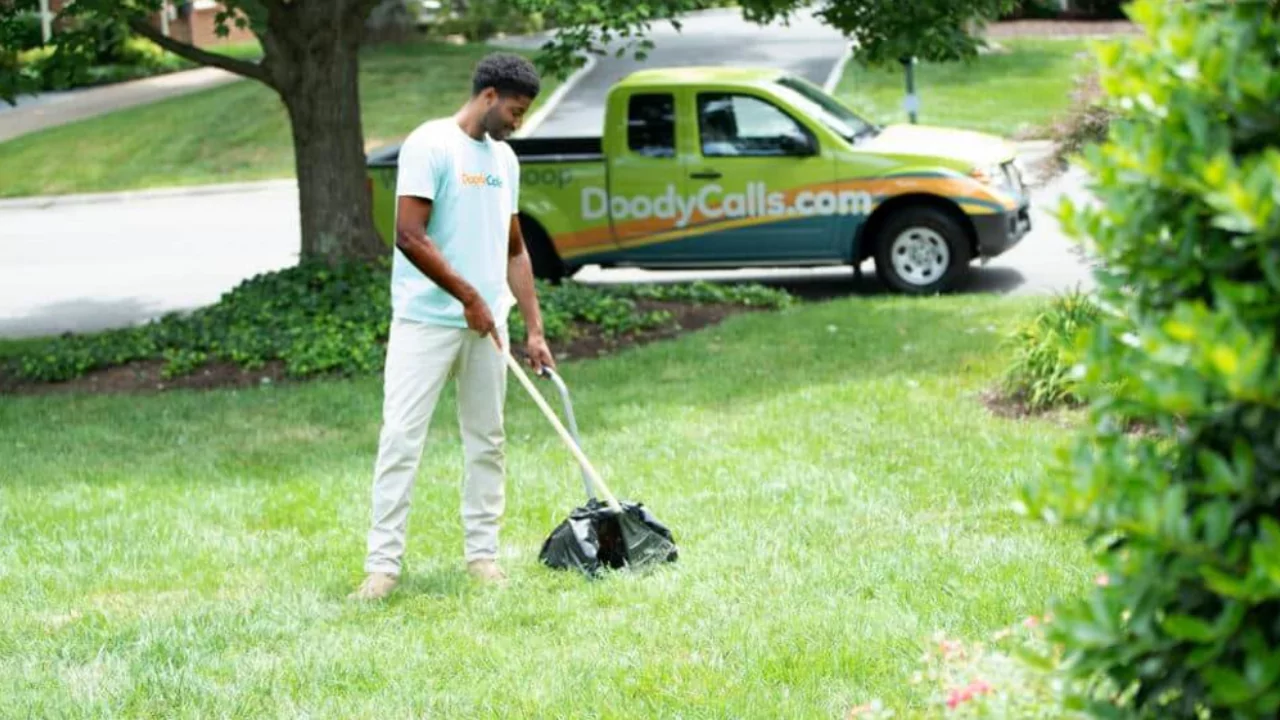
No matter if you have one dog or three, and whether they weigh five pounds or a hundred, picking up your dog’s waste is one of those dirty jobs nobody wants to do. However, this needs to be done so that you don’t put your yard, dogs, children and even yourself at risk for the mess and diseases that accompany it.
Not only does it smell bad, but also ruins one’s day (or shoes) when stepping into the hidden landmine left behind.
Dog Poop Cleaning Ideas
There are several options available when it comes to cleaning up dog poop. There are traditional doggie bags which can be thrown away as well as flushable ones that can be disposed of in toilets.
Another option is a pooper scooper which comes in different kinds such as specialty items and even systems that help train dogs to defecate in designated areas so owners do not have to search through yards for hidden leftovers.
Many people deal with the poop problem by walking their dogs at least twice a day, teaching them to go on schedule. For those who prefer doggie bags and getting out with their pets, this is an excellent option. As always, not cleaning up after your dog can lead to receiving a fine.
Children in the neighborhood form a good source of labor for picking up canine waste. It’s easier than how it seems – much like everything else, establishing balance ensures minimal effort in maintenance down the line.
Dog Poop Cleaning Service
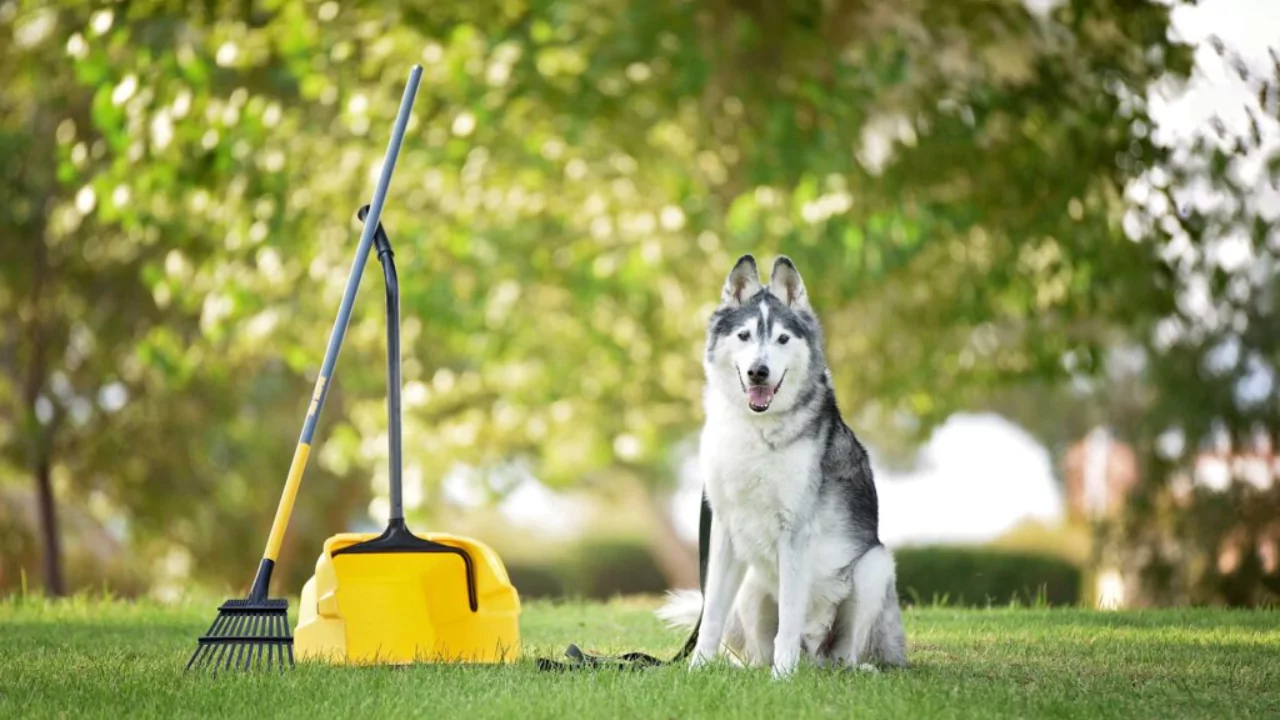
There are services that you can hire to come clean up and will charge you either by the hour or per pooch if it’s a recurring (daily or weekly) service. Children in your area may want to take this up at a few dollars and numerous lawn care companies offer dog pooper scooping as part of their hourly or yard rate.
If you are busy or physically unable to do it, have grown tired of undertaking this task but are willing to pay for it, hiring someone will serve you well.
Types of Pooper Scoopers and Rakes
There are many available tools that will perform the poop cleanup effectively. Dog Poop Rakes for example allow you to scoop up the litter with a rake and place it in a container or trash bag.
There are also devices that have jaws shaped like excavators which open and close and can grip with sufficient strength to grab the poop so it can be discarded. These jaw poop scoops work well on grass surfaces.
In addition, there are small shovel-like devices designed to catch and scoop up as they pick up the litter pans filled with suspended waste matter. Most of these materials are effortless for you, and all aim at reducing the amount of stooping that you’ll need to undertake in order to pick after your dog has relieved itself outside.
There are also high-tech ways to dispose of that waste. For example, what about a built-in septic system specifically designed for dogs like the Doggie Dooley Septic Tank Style System? This is one way to keep your yard poop free and safe.
These functions similarly to how home septic systems work, providing a centralized zone in the yard where “flushing” can occur into an underground chamber, which uses enzymes or natural processes to break down the waste (compost) and allow it to seep into the soil surrounding the system.
You can fairly easily construct homemade versions using a 5-gallon bucket, waste enzymes intended for camping toilets or porta-potties, and an excavated area filled with gravel.
The dog feces is placed in the bucket positioned amid the gravel pit. While doing so, the enzymes commence their work and when enough composting occurs, rainwater replenishes and carries everything towards the gravel filter where eventually it reaches soil surrounding this entire structure.
Dog Poop Cleaning Tips
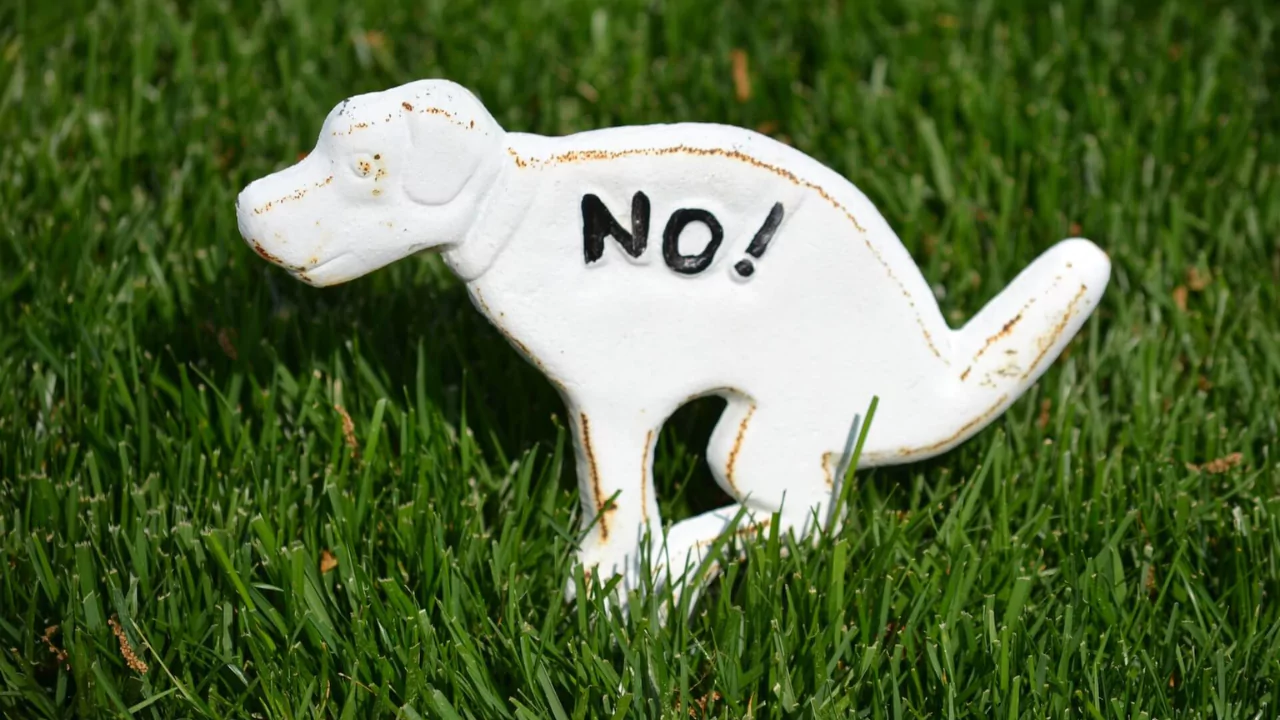
To avoid putting extra stress on your back when cleaning after your dog whether during walks or at the yard, ensure to bend at the knees while keeping your back straight. Avoid actions that could lead to straining or repetitive strain injuries.
Encouraging dogs to go in designated areas makes tracking and locating every poop much easier eliminating hunting before cleanup. As a result, curves the time required for cleaning up tremendously.
Preventing Dogs From Pooping in Your Yard
For dogs that are not yours, controlling access of other people into your yard may be an option worth considering. Purchasing items such as “No Poop Here” signs would give nudge to neighbors allowing them more relabel routes without encouraging them too far off.
Common Questions and Answers About Cleaning Dog Poop Out of Your Yard
Are there any biodegradable dog poop bags?
Bags designed for picking up dog feces are now available and are more environmentally friendly compared to plastic bags that do not decompose. Oxo-biodegradable bags will try to break down into smaller pieces but only time will determine if the smaller parts will completely disintegrate.
Maize flour and vegetable oil make fully biodegradable bags. There are also paper bags which can be used to collect dog poop, as they decompose naturally. Other suggested materials include tissue or junk mail, as well as leaves, which would otherwise end up in waste and can easily decompose.
What’s the best dog poop bag?
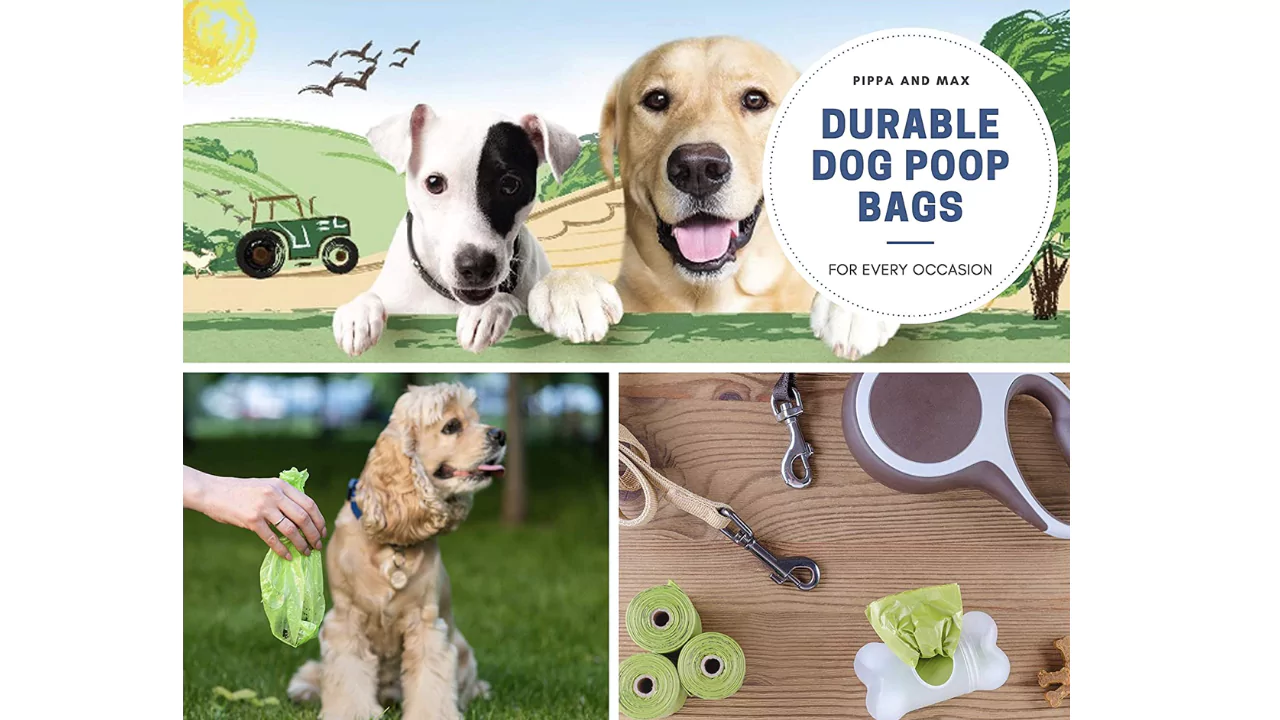
While traveling in California, we found Mutt Mitt’s Dog Poop Bags. Without a doubt, they are the best bags that we have ever come across. They are manufactured in USA and are easy to use. The bottom part is made of double thick plastic which guarantees you will never touch your pet’s waste directly.
Poop bags don’t usually come well thought out as this one does. The Mutt Mitt is superior of all other brands. (If you think you know one better than us, please leave a comment below and let us know).
Can I add dog poop to compost?
Generally speaking, the answer to adding dog poop onto compost remains no. In fact, on many internet sources you often see pet waste listed as materials which should not be included into compost piles simply because there are numerous restrictions that need to be met in order for it to safely put in there.
The composting process has to reach certain thresholds of heat and maintain it long enough to kill off any potential harmful bacteria over time present within the mix in order for it to be safe to use.
However, if you’re interested specifically in being able to eliminate your dog’s waste with some form of recycling system such as through composting, there exist special composter devices meant exclusively for breaking down pet-aided waste materials.
Even with that equipment, though, you should only use compost that contains pet waste on ornamental flowers, and never on a vegetable garden, fruit trees, herbs, or any other crops which can be consumed.
To learn more about effectively composting dog feces, kindly refer to this USDA Natural Resources Conservation Service pamphlet.
Can you bury dog poop?
No. Dog poop shouldn’t be buried. Burying dog feces is deemed pollution and poses potential risk to the soil and water.
Sinking dog waste can create danger by exposing people to contagious pathogens such as Ancylostoma, Cryptosporidium, E. coli, Giardia, Salmonella and Toxocara canis. If placed close to water bodies, it will enhance algae bloom leading to fish mortality through suffocation due to algae.
Rather than burying it pet owners should consider picking up with the biodegradable glove and bagging it then tossing in trash or flushing down toilet
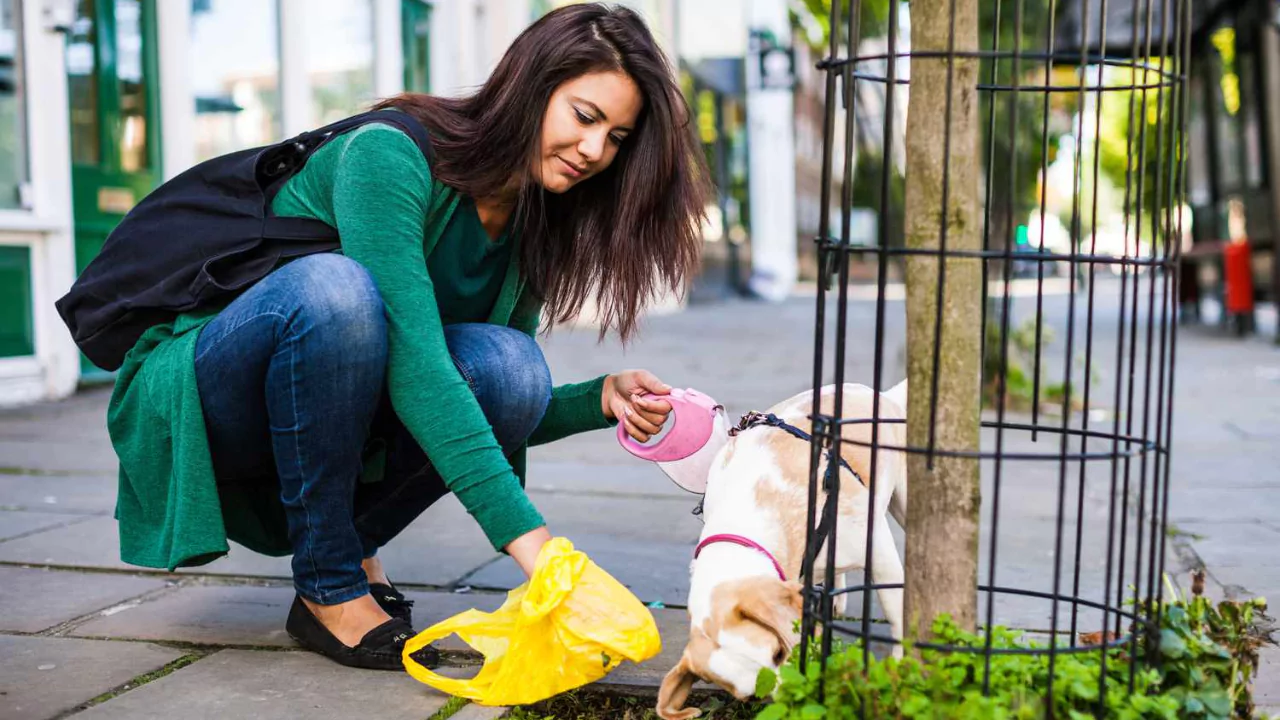
Can you get sick from touching dog poop?
Yes! Touching of dog feces is very dangerous as one stand need the right medical attention. It has been scientifically proven beyond reasonable doubt that modern puppies do have taps fenced nuclei which includes Ancylostoma Camper Cryptos us E coli Jiya’s some liver from mate ms as well morbidly stock joke who left licking bed but Tomorrow morning tortoises come.
Can you put dog poop down the sewer?
As long as there are no city regulations against it, you’re free to either toss it in the trash or flush it down the toilet. That said, it’s unwise to throw dog waste into a toilet attached to a septic tank system unless you’ve received confirmation from the installer or manufacturer that it’s safe to do so.
Can you put dog poop in a compost bin?
Best practices suggest not including pet waste into compostable materials; however, under certain conditions dog feces can indeed be turned into compost as long as the end product isn’t meant for use on plants that will bear fruits, vegetables or herbs for human consumption.
Composting with pet waste must achieve extremely high temperatures in order to eliminate any pathogens that could infect humans. There are dedicated pet waste composters available for purchase.
To read more about safely turning dog feces into compost, feel free to access this pamphlet published by USDA Natural Resources Conservation Service.
Does dog poop go away?
While time and natural elements can facilitate the decomposition process of dog feces, there are numerous reasons why one should not leave it lying around.
Fecal matter from dogs is a potential source of many diseases that are transmissible to humans such as Ancylostoma, Campylobacter, Cryptosporidium, E. coli, Giardia, Salmonella, and Toxocara canis.
Furthermore, pet waste can spread parasites such as hookworms, ringworms and tapeworms. These pathogens do not decompose like other organic materials nor wash away like waste material will eventually do.
In addition to this microbiological threat, canine feces contribute to landscaping destruction since they are toxic for lawns and plant life due to their high-protein diet which makes their waste highly acidic.
Plants exposed to dog excrement will suffer discoloration and burn damage.
Does dog poop have methane?
Indeed it does arise from canine feces. According L.A Times Chicago city’s 68 million pounds annually collected dog faeces generates 102 million cubic feet of unburnt methane gas- proving this “methane is an odorless gas produced while microbes present in dog poop digest the poop during the decomposition phase.”
Does dog poop kill grass?
The grass will not be damaged by a single piece of dog excrement, but rather by an excessive quantity left in one area. This is due to the copious amounts of nitrogen present in dog waste which can kill the grass.
When this happens to a lawn, you would observe brown or yellow patches appearing. “Urine burn” is the common term for this phenomenon. Applying too much fertilizer to your lawn or plants in your garden has the same burning effect.
Dogs sometimes damage areas with concentrated peeing and pooping over time, especially when weather conditions are warm, leading to even more stress coupled with dry conditions.
After such damage occurs, the only remedy is to reseed or replace sod along with refreshing the infested soil around that region which was burned.To stop dog feces from ruining your grass, there are some strategies you can follow.
Also, picking up pet waste promptly instead of allowing it to remain on your yard also aids. Don’t put fertilizer in sections of your lawn that already receive an excess of nitrogen due to dog waste.
You may mitigate the impacts pet feces have on the lawn by designating a limited area for the pets to do their business. It is also possible for you to plant grasses that are less likely to be harmed by pet waste.
As a preventive measure concerning the high nitrogen levels in a dog’s droppings, adding water either to the dog’s dry food or spraying over areas where your dog relieves himself will suffice to balance things out effectively.
Encouraging proper waste management through immediate cleanup coupled with concurrent watering effectively mitigates burn damage from canine urine and actively harnesses nitrogen as plant nourishment instead.
Does vinegar dissolve dog poop?
Vinegar is antiseptic, antibacterial, and antimicrobial. It may not dissolve dog poop completely, but you can use it for cleaning stubborn stains during the final cleanup process. Vinegar will also eliminate the poopy odor.
Always conduct a spot test in an inconspicuous area first to see if the surface you wish to clean is safe from damage due to vinegar’s mild acidity. After cleaning up the poop, you can apply a neutralizing vinegar solution (1:1 ratio of water and white vinegar) to avoid staining and further protect your carpets from residue.
For treatment of lingering stubborn stains, apply a stronger solution of 16 ounces of water mixed with three ounces of white vinegar along with two or three drops of dish soap. With this solution on the stain, allow it to penetrate for a few minutes before placing a folded towel over covered areas and blotting to absord excess moisture.
How dangerous is dog poop?
It is unpleasant to have dog poop on the lawn or other locations since it contains biowaste and pathogens that may take a longer time to break down.
Some contagious diseases for humans caused by the dog poop includes Ancylostoma, Campylobacter, Cryptosporidium,E. coli, Giardia, Salmonella, and Toxocara canis.
Additionally, dogs are known to be the source of infectious ang pasyuk worm (hookworm), ringworm (tapeworm) and others.
How do you dispose of dog poop?
The best options for disposing of dog feces include wearing gloves or biodegradable bags so picking them up with care like any disposable trash which can either be thrown away in a bin or flushed down toilet.
Ensure there are no restrictions regarding disposal through flushing in your area ordinance prior to doing such.
How long do biodegradable dog poop bags take to decompose?
While plastic biogradable dog waste bags are a more ecofriendly option taking three to six months as opposed to non-biodegradable which can literally rest there for several hundred years ,scoffably enduring due lack-of-breakdown process fully until onto little pieces sans oxo-bio degradable bags prone forever stuck into shards.”
Is dog poop good for composting?
Pet waste is often included on lists of items that should not be composted. This is due to the strict regulations you must follow if you choose to compost pet waste. Even when these regulations are followed, pet poop should not be used where bodiless plants like fruits, vegetables or herbs will grow.
To get rid of the pathogens that might infect humans contained in dog poop, the compost must reach high temperatures. For safe methods to dispose of dog poop, refer to this pamphlet from USDA Natural Resources Conservation Service.
Is dog poop good for plants?
It is easy to see why gardeners mistakenly assume dog feces are fertilizer; cow manure and other animal stews are sometimes used as soil nutrients. But dog feces are absolutely not good for nurturing crops and can actually harm or kill them.
Due to a dog’s diet being heavy in protein, their stool contains dangerous levels of acid and nitrogen. Excessive exposure would lead to a “burn” causing death over time similar what over fertilization with nitrogen rich fertilizer would do.
Is it bad to leave dog poop in the yard?
Dog owners must be cognizant of all animal waste management, as it negatively affects the health of both plants and humans. The process of decomposition from pet excrement gradually releases an excess amount of nitrogen into the soil, which in turn penetrates nearby vegetation.
This results in “Urine burn,” a condition common among plants where they cannot absorb sufficient water due to overabundant nitrogen.
The same phenomenon occurs when plants are doused with fertilizers. Furthermore, neglecting our furry friend’s excrement poses a threat to humans since pet waste contains hazardous health risks like Ancylostoma, Campylobacter, Cryptosporidium, E. coli, Giardia, Salmonella and Toxocara canis along with parasitic worms such as hookworms, ringworm and tapeworms.
Is not picking up dog poop bad for the environment?
If not cleaned, dog poop takes close to a year to fully decompose and during this period of time, it poses several risks to the environment. Leaving feces in your yard comes with the additional burden of fetching pathogens like Ancylostoma, Campylobacter, Cryptosporidium, E. coli, Giardia, Salmonella and Toxocara canis along with hookworms, ringworms and even tapeworms.
Not cleaning it up also threatens watersheds and is a significant contributing factor to 20 – 30% of the watersheds bacteria samples. That’s not all. The environmental cost of dog poop contributes approximately 10-50% of airborne bacteria as well.
What diseases can you catch from dog poop?
Dog poop can be carriers for many infectious diseases posing potential zoonotic threats to humans. The remote spheres of possibility suggest human parasites within dog feces could range from low probabilities like hookworms as well as high ones such as ringworms or even tapeworms.
Dog poop also contains the pathogens Ancylostoma, Campylobacter, Cryptosporidium, E. coli, Giardia, Salmonella, Toxocara canis, and Yersiniosis.
What happens to dog poop in grass?
Dog poop, when left on grass, can take nearly a year to properly decompose. During the decomposition process, pet waste significantly contributes nitrogen into the adjacent soil and grass, which may result in “urine burn,” plant tissue damage, or even death to nearby vegetation.
Furthermore, pet dog poop is a source of parasites such as hookworms, ringworms and tapeworms along with other zoonotic diseases that affects humans like Ancylostoma, Campylobacter, Cryptosporidium E. coli, Giardia,Cryptosporidium ,Salmonella ,Toxocara canis and Yersiniosis .
What is the most environmentally friendly way to dispose of dog poop?
For pet owners aiming to manage their dog’s poop in an eco-friendly manner, they have three viable options: store it in biodegradable bags for disposal, compost it, or flush it down the toilet. If choosing to dispose of dog waste via trash removal, ensure that the bag used to collect and dispose of waste is indeed biodegradable.
Avoid oxo-biodegradable bags as these do not completely biodegrade and instead fragment into smaller pieces. For collecting dog waste, paper bags are a biodegradable alternative just like the biodegradable plastic bags available on the market.
Before opting for flushing dog poop down the toilet, contact local water treatment facilities or check with relevant municipal departments if this practice is allowed within your region as some facilities might not be equipped to manage pet waste.
Lastly, while you may often see pet poop listed as materials that should not be composted, under certain conditions (where compost would not be applied on consumable plants such as fruits, vegetables or herbs), composting can still be done.
There is a need for high temperatures in order to eliminate pathogens including bacteria found in a dog’s poop which must also be reached by the compost containing dog feces. Learn about the safe ways to compost dog poop in this pamphlet by the USDA Natural Resources Conservation Service.
Why do most composting resources discourage composting of pet waste?
Typically, one will find pet waste in lists of items which should not go into a compost pile because there are numerous strict guidelines that need to be followed for dog poop to be safely composted.
For example, under the safest possible scenario, compost that contains dog poop can never be used on crops (veggies, herbs or fruit trees) which humans consume directly.
Pet feces also come with a whole range of diseases such as parasites and bacteria and so must reach high temperatures when being cooked before it is added to any form of plant matter.
To understand how you can safely do this yourself, please refer to the pamphlet provided by USDA Natural Resources Conservation Service.